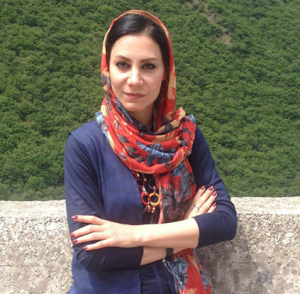 UPDATE 3 Oct 2024: Christian convert Laleh Saati, who is serving a two-year sentence in Evin Prison for her Christian activities, has been denied parole because she refused to record a forced confession and public disavowal of reports about her case, Human Rights in Iran reports. Laleh is eligible for parole, having served one-third of her sentence. She has also reportedly been refused release with an electronic tag.
UPDATE 3 Oct 2024: Christian convert Laleh Saati, who is serving a two-year sentence in Evin Prison for her Christian activities, has been denied parole because she refused to record a forced confession and public disavowal of reports about her case, Human Rights in Iran reports. Laleh is eligible for parole, having served one-third of her sentence. She has also reportedly been refused release with an electronic tag.
During the summer Laleh was threatened with new court proceedings as a result of the publicity her case has received. Human Rights in Iran reported in July that she had been taken back from the women’s ward in prison to the infamous Ward 209, which is under the jurisdiction of the Ministry of Intelligence, for a 24-hour interrogation. Her elderly mother has also reportedly been interrogated and warned that Laleh may face a second conviction because the case has been publicised to foreign media and warned that a case may be opened against her for the same reason.
UPDATE 13 May 2024: Laleh’s mother recently visited her in prison and says she is struggling with her mental health, due to the pressure she has been under since being imprisoned in February, and needs psychological help. Laleh’s mother reportedly asked judge Iman Afshari whether he might reduce her daughter’s sentence but was told that she must wait for the result of her appeal.
Christian convert Laleh Saati (45), who was baptised in a church in Malaysia, has been sentenced to two years in prison in Iran for “acting against national security by connecting with ‘Zionist’ Christian organisations”.
Laleh Saati returned to Iran from Malaysia in 2017, frustrated at the time it was taking to process her asylum claim and wanting to be reunited with her elderly parents. Since then intelligence agents have summoned and interrogated her on numerous occasions.
On 13 February 2024 Laleh was arrested at her father’s home in Ekbatan Town, a suburb of Tehran, and taken to Ward 209 of Evin Prison, which is under the jurisdiction of the Ministry of Intelligence. She was reportedly interrogated for around three weeks, during which time photographs and videos of her Christian activities and baptism in Malaysia were brought before her as evidence of her “crime”, before being transferred to the women’s ward of the prison.
On 16 March Laleh was brought before the notorious judge Iman Afshari at Branch 26 of the Tehran Revolutionary Court, who has built a reputation for harsh sentencing of Christians. He reportedly asked her why she had risked returning to Iran and having a court case opened against her, “given that you have done such things outside of Iran”.
On 25 March Laleh’s lawyer was informed that she had been sentenced to two years in prison plus a two-year travel ban following release. Laleh’s family members were then informed and were able to pass on the information to her in prison. It is not yet known whether bail has been set, nor whether Laleh intends to appeal against her sentence.
Director of Article 18 Mansour Borji expressed surprise at the speed with which Laleh’s case had progressed through the courts and commented, “Laleh’s case clearly shows that the Christian activities of asylum-seekers in foreign countries can be used against them in court proceedings back in Iran. I hope immigration authorities around the world will take note of this, and think twice before rejecting out of hand the asylum claims of genuine Christians who may face persecution upon return to their country of origin.”
Article 18 notes that most Western countries accept that Christians are persecuted in Iran and reports that the European Court of Justice recently ruled that even asylum-seekers who converted to Christianity outside their country of origin may meet the requirements for refugee protection if they come from countries where Christians are persecuted. However, many asylum seekers whose claims are based on professed religious conversion have had their cases rejected, mostly because judges have not believed the conversion to be genuine.
(Article 18, Human Rights in Iran)
Photo credit: Facebook via Article 18
